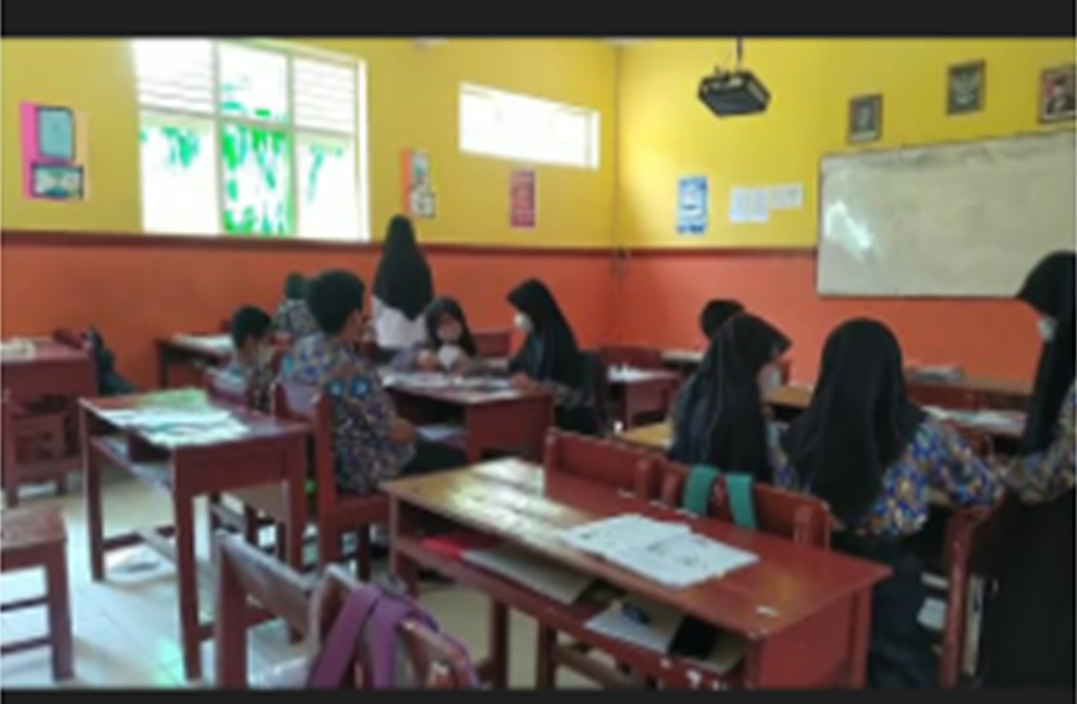The impact of task-based activities in reading skill for the students during covid 19 pandemic
DOI:
https://doi.org/10.21070/jees.v7i1.1532Keywords:
reading, reading skill, strategy, task based activitiesAbstract
This study aims to investigate the impact of using task-based activities in reading skill for the eight students of junior high school of SMPN 4 MDN. Quantitative research was employed in this research. It was quasi experimental research design which used pre-test – post-test control group design. The population of this research were the eighth grade students of SMPN 4 MDN. The samples of this research were 8B as experimental class and 8C as control class. The sample was taken by using random sampling. In collecting the data, the researchers used reading test. The researcher used independent t-test on SPSS version 21 to analyze data. The results shows that the students who are treated by using task-based activities are more effective than the students who are treated by using conventional teaching. It means that teaching reading by using task-based activities gives a better influence on students’ reading skill.
HIGHLIGHTS:
- Task-based learning affects how students acquire good informational reading skills both during and after the COVID-19 pandemic outbreak.
- Students in the experimental group learn more than students in the control group.
- During the tasks, students have the opportunity to share their knowledge about the topic, as well as exchange ideas and information.
Downloads
References
Ariandika, A. G., & Kartikawati, D. (2018). Effective Method of Teaching Reading (a Case Study). Jurnal Bahasa Lingua Scientia, 10(2), 275–286. https://doi.org/10.21274/ls.2018.10.2.275-286
Chalak, A (2015). The effect of Task-based Instruction on Reading Comprehension of Iranian EFL Learner. Applied Research on English Language, 4(1), 19-29.
Chen, Pi-Ching, & Chen, Chien-Ying. (2005). Bridging Reading and Writing: A Collaborative Task-Based English Instruction. WHAMPOA- An Interdisciplinary Journal, 49, 349-366.
Creswell, J, W. 2003. Research Design: Qualitative, Quantitative, and Mixed Method Approaches (2nd ed). California, USA: Sage Publication.
Creswell, J, W. 2009. Research Design : Qualitative, Quantitative, andMixed Methods Approaches. Newbury Park: Sage Publications.
Dewi, U., & Salmiah, M. (2019). Students’ Reading Strategies At English Educational Department. AL-ISHLAH: Jurnal Pendidikan, 11(1), 126. https://doi.org/10.35445/alishlah.v11i1.122
Esfandiari, M. (2014). Task-Based Writing to Improve Young Teenage Learners’Reading Skill. World Journal of English Language, 4(1), 20-24.
Hamidi, A, A. A. (2013). Teaching Reading Narrative Text by Using Directed Inquiry Activity (DIA) Technique at Junior High School Ahmad. Journal of English Language Teaching, 1(3)(9), 1689–1699.
Hanewald, R., & Trust, C. E. (2013). Evaluating Reading Laboratories for Students of English in a Malaysian Secondary School Context. 1, 148–159.
Irfan, I. (2017). THE EFFECT OF TASK-BASED LANGUAGE TEACHING ON STUDENTS’ READING COMPREHENSION. (ENGLISH EDUCATION JOURNAL (EEJ), 8(1)), 68–70.
Jiang, X., & Grabe, W. (2007). Graphic organizers in reading instruction: Research findings and issues. Reading in a foreign language, 19(1), 34-55.
Keyvanfar, A., & Modarresi, M. (2009). The impact of task-based activities on the reading skill of Iranian EFL young learners at the beginner level. The Journal of Apllied Linguistics, 2(1), 81–102.
Küçükoğlu, H. (2013). Improving Reading Skills Through Effective Reading Strategies. Procedia - Social and Behavioral Sciences, 70, 709–714. https://doi.org/10.1016/j.sbspro.2013.01.113
Mao, Z. (2012). The application of task-based language teaching to English reading classroom. Theory and Practice in Language Studies, 2(11), 2430–2438. https://doi.org/10.4304/tpls.2.11.2430-2438
Maulana, Y., & Fitrawati, F. (2017). TEACHING READING BY USING COMIC STRIPS TO IMPROVE JUNIOR HIGH SCHOOL STUDENTS’COMPREHENSION. Journal of English Language Teaching, 6(1), 124-131.
Martika, W., & Hermayawati, H. (2016). Improving Students’ Reading Skill By Using Quantum Learning. JELE (Journal of English Language and Education), 2(2), 118. https://doi.org/10.26486/jele.v2i2.227
Mesbah, M. (2016). Task-based Language Teaching and Its Effect on Medical Students’ Reading Comprehension. Theory and Practice in Language Studies, 6(2), 431-438.
Restanto, M. (2016). The Use of Picture Book in Teaching Reading for Junior High School Students. Journal of English and Education, 4(2), 49-62.
Rosyida, F, & Ghufron, M, A. (2018). Herringbone and Tri Focus Steve Snyder Technique: The Techniques for Teaching Reading Comprehension Viewed from Students’ Reading Habit. International Journal of Instruction, 11(03), 603-616.
Suryani. (2017). Teaching Reading Narrative Texts Through Story Impression Strategy to Islamic Junior High Students. Jurnal Pendidikan dan Pengajaran, 4(2), 39-47.
Tahmasebi, S, & Yamini, M. (2011). Linking Task-based Language Teaching and Sociocultural Theory: Private Speech and Scaffolding in Reading Comprehension. Advances in Language and Literary Studies, 2(1), 41-55.
Ulfiati, L. (2012). MOODLE and Improvement of Students’ Reading Comprehension. Englishes for Comunication and Interaction In the Classroom and Beyond, 389-400.
Yansyah. (2014). Best Practice in Teaching Reading: Succes Stories from Experienced Teachers. Success Stories in English Language Teaching and Learning, 431-441.

Published
How to Cite
Issue
Section
License
Copyright (c) 2022 Erlik Widiyani Styati, Robingatun Khasanah

This work is licensed under a Creative Commons Attribution 4.0 International License.







